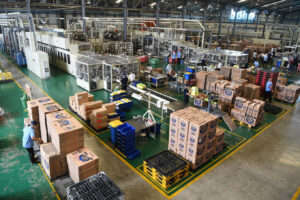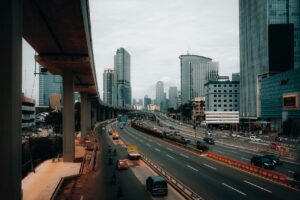
The government will increase the infrastructure budget to be Rp419.2 trillion next year. In the 2020 state budget plan (RAPBN), the budget increases by 4.9% from the 2019 infrastructure budget allocation which is Rp399.7 trillion.
Finance Minister Sri Mulyani Indrawati said that, for next year, the infrastructure budget that skyrocketed was road construction.
“The 837 kilometres (km) of roads built are double of this year’s road construction target, which is 406 km. Most of the construction of those roads are intended for connectivity improvement,” Sri Mulyani said in Jakarta on Friday.
She explained that the infrastructure development policy was meant to accelerate infrastructure development, in order to act as a support for industrialisation transformation in response to the fourth industrial revolution.
Besides increasing road length, bridge construction is also implemented. This year, the government is planning to build bridges spanning 6.9 km in total. Then, the government will continue with railway tracks construction spanning 238.8 km in total. The railway tracks construction is recorded to be shorter compared to the railway tracks construction in 2019, which is set to be 269.45 km. Other infrastructure that will be built are three new airports, 49 dams, as well as 5.224 low-cost apartment (rusun) units and 2,000 houses for low-income citizens.
Therefore, Sri Mulyani said that infrastructure development improvement through a creative financing breakthrough for infrastructure completion acceleration by cooperating with private companies and SOEs (State-Owned Enterprises) will be implemented to fulfil the development financing requirement.
“We will also optimise Public-Private Partnership (PPP) options for long-term financing policies outside of the state budget (APBN),” Sri Mulyani revealed.
This PPP scheme is set to build 11 projects with a potential project value of Rp19.7 trillion in 2020. Besides that, the government has four focuses for its budget, namely education, healthcare, social protection, and infrastructure.
Furthermore, the Assessment of the Strategic Plan and Budget for Ministries and Non-Ministries (RKAK/L) for fiscal year 2020 mentioned that the PUPR (Public Works and People’s Housing) Ministry received a budget ceiling of Rp120.22 trillion which derived from 83.1% from pure rupiah, 12.6% from State Syariah Securities (SBSN), and 4.2% from foreign loans.
In 2020, the PUPR Ministry will continue its priority and strategic activities, especially in the infrastructure sector to boost national priority achievements, which are infrastructure and balanced regional development, as well as food, water, water, and living environment sustainability. Those national priorities are implemented through a water resource management by improving quantity, quality, and water accessibility, which is covered by on-going dam constructions (49 dams).
Besides that, the road implementation program is a multi-transportation mode and an inter-transportation mode improvement that boost economic growth, which covers 837 km of new roads and 6.88 metres of new bridge constructions; as well as a housing development program which is a basic infrastructure expansion that covers the construction of 5,224 low-cost apartment units and 2,000 special house units.
In line with the government’s budget policy that diverts expenditure to a more productive expenditure and focuses budget for infrastructure, the PUPR Ministry has become one of the ministries with the biggest budget for 2015 to 2019, which grows by 4% in average. There was quite a significant increase in 2016, which was by 21%. It was caused by the government’s policy to accelerate basic infrastructure provision, such as housing, road and bridge constructions, as well as infrastructure development which supported water sustainability, such as dam constructions.
Transportation Ministry’s Budget
Furthermore, Transportation Minister Budi Karya Sumadi explained that, in the 2020 RAPBN, the Transportation Ministry was preparing to obtain a budget of Rp42.7 trillion, which was not very different to how much it had received from the 2019 APBN, which was Rp41.4 trillion.
“The planned budget ceiling that will be received by the Transportation Ministry in 2020 will be allocated for a number of strategic programs at each subsector,” Budi Karya stated.
The Transportation Ministry said that, in the air transportation sector, his agency was planning to allocate Rp514 billion for the subsidy of 192 routes of pioneering air transportation, Rp346.5 billion for work on the construction of four new airports, Rp320 billion for new terminal developments at 14 airports, as well as Rp563 billion for air side capacity improvement at 27 airports.
In the sea transportation sector, the Transportation Minister said that his agency would continue construction at Patimban Port in Subang, West Java. Besides that, in the sea sector, Rp46.6 billion will be allocated for six routes of cattle shipping, Rp979 billion for 113 routes of pioneering shipping, Rp349 billion for 21 routes of maritime highway, and Rp3.9 trillion for sea port facilities development.
In the railway sector, the Transportation Ministry will increase the connectivity of airport trains in a number of regions, such as the Yogyakarta International Airport Train. Moreover, in order to lower the load on the APBN, the Transportation Ministry is implementing infrastructure development with a PPP scheme, similar to what was implemented for Adi Soemarno Airport Train and Jabodebek Light Rail Transit (LRT).
In total, the Transportation Minister said that railway tracks construction in 2020 was set to span 238 km with Rp3.62 trillion. The increase and rehabilitation of railway tracks are 229 km and valued at Rp1.59 trillion.
“We are also focussing on human resource development (SDM), how to boost SDM in the transportation [sector], especially in sea [transportation]. So, there will be education [for] 380,000 individuals, [for which], Rp3.1 trillion is prepared,” he stated.
Transportation Minister Budi said that, in the land transportation sector, Rp750 billion was allocated for the improvement of type A terminals at 20 locations, Rp250 billion was allocated for road equipment provision, Rp135 billion was allocated for land transportation subsidy on 307 routes.
Referring the RKAK/L for 2020 fiscal year, the budget ceiling of the Transportation Ministry is Rp42.67 trillion, which derived 66.1% from pure rupiah, 16.2% from SBSN, 6.8% from foreign loans, 6.9% from non-tax revenue (PNBP), 3.98% from BLU (Public Service Agency). From the budget total, 9.5% is allocated for staffing expenditure, 40.8% is for goods expenditure, 49.7% is for capital expenditure.
The Transportation Ministry will continue the priority and strategic activities especially in connectivity, safety, and security improvement, as well as excellent transportation service so that it improves public economy, creates employment opportunities, and lowers regional discrepancy to provide a bigger benefit for citizens.
Kindly fill in the form below, our consultant will get in touch as soonest.
Alternatively, you can call at +62 815 629 0000 (whatsupp available) or email to info@bizindo.com




 20% off today. Whatsapp us!
20% off today. Whatsapp us!